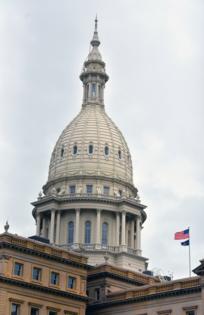Trump tax cut law blows $1.1B 'hole' in Michigan budget, new report warns
Published in News & Features
A new $1 billion financial hit, spurred by a tax law signed by President Donald Trump, is poised to complicate Michigan lawmakers' mission of crafting a state budget and avoiding a government shutdown, suggests a new report from a nonpartisan research group.
The 13-page analysis from the Citizens Research Council of Michigan, released Wednesday, determined the federal One Big Beautiful Bill Act (OBBBA) would immediately have "a major impact" on the state's budget for the next fiscal year, which begins Oct. 1.
The report echoed findings from the nonpartisan Michigan House Fiscal Agency, which stated last week that changes to federal tax policy would result in a $677 million reduction in state business tax revenue next year.
On top of that number, the Citizens Research Council said legislators will likely need to find $450 million in General Fund money to offset the elimination, by the federal government, of a state tax on health insurers that's been used to support the state's Medicaid program, which provides health coverage for low-income residents.
"Regardless of the eventual outcome, all parties need to recognize that the OBBBA will bring a new $1 billion challenge to these discussions," the Citizens Research Council report said.
In February, Democratic Gov. Gretchen Whitmer kicked off the budget negotiations in Lansing by proposing an $83.5 billion spending plan for the next fiscal year. The Democratic-controlled Senate passed its own full $84.6 billion state budget proposal in mid-May.
However, the Republican-led House has approved only a budget plan for schools, universities and community colleges, leaving questions lingering about its ideas for funding state agencies and road projects. House Speaker Matt Hall, R-Richland Township, has called for diverting about $3 billion in existing revenues to improving the state's transportation infrastructure.
Trump signed the federal bill that features an array of tax breaks and spending cuts into law on July 4. The White House said the policy represented "a once-in-a-generation piece of legislation."
"The one big beautiful deal is all about growth," Trump said in a post on social media on July 2. "If passed, America will have an economic renaissance like never before."
To offset the tax cuts, the federal legislation will mandate increases in state-level payments toward Medicaid and the Supplemental Nutrition Assistance Program, which provides food aid to needy residents. The changes could increase Michigan’s spending on these programs by over $1 billion by fiscal year 2032, according to the Citizens Research Council.
In the near term, the policy creates "a $1.1 billion hole" in the budget plan the governor recommended in February, the Citizens Research Council's report found.
That hole is being partially driven by tax changes that benefit businesses in the One Big Beautiful Bill Act, which will have ripple effects on Michigan’s corporate income tax collections, according to the nonprofit.
As one example, the federal law includes a provision that allows firms to immediately deduct domestic research and experimental expenditures, according to the House Fiscal Agency. For next year, that change represents $449 million of $677 million in lost state-level business tax revenue, according to the agency.
Meanwhile, the Citizens Research Council said state lawmakers should hold back $450 million in ongoing General Fund revenue to recognize the likely need to address the loss of the state's Insurance Provider Assessment. The One Big Beautiful Bill Act takes aim at provider taxes designed to leverage additional federal funding to boost Medicaid reimbursement rates, the nonprofit said, adding that a proposed federal rule would also "immediately prohibit Michigan from assessing the IPA."
The only alternative to shifting General Fund money for the loss of the provider assessment would be to absorb a $1.5 billion hit to the Medicaid program, representing the $450 million in assessment revenue plus roughly $1 billion in federal dollars that it leverages, the Citizens Research Council said.
Even before the federal changes, the House and Senate were at an apparent stalemate in their budget negotiations. They missed their self-imposed July 1 deadline to approve a budget, and last week, Hall unilaterally removed the top House Democrat on the appropriations committee, Rep. Alabas Farhat, D-Dearborn, from his position.
Now, they have until Oct. 1, when the next fiscal year begins, to avert some level of state government shutdown.
House Appropriations Chairwoman Ann Bollin, R-Brighton Township, said House Republicans anticipated there would be impacts on the state budget from federal tax law changes and she was still optimistic a compromise could be reached. But she acknowledged that the repercussions made the process more difficult.
“We need to be very thoughtful in our approach," Bollin said Wednesday. "We are going to continue on our course.”
The impacts of the federal policy will primarily strike the state's General Fund, which was previously expected to have about $15.1 billion in revenue next year.
Robert Schneider, senior research associate for state affairs for the Citizens Research Council, said K-12 schools in Michigan, which are funded through the School Aid Fund, should be concerned about lawmakers shifting dollars from the School Aid Fund to replace lost General Fund money.
The School Aid Fund is primarily supported by sales tax and personal income tax revenue, while business tax dollars go to the General Fund.
"If we need to make sizable general fund cuts in the budget, one of the options that will likely get looked at is shifting School Aid Fund back to universities," Schneider said.
Before Trump signed the One Big Beautiful Bill Act, House Republicans had already proposing directing about $2.3 billion in School Aid Fund money — dollars that have traditionally primarily gone to schools — to universities and community colleges.
The strategy would free up General Fund dollars as Hall sought $3 billion in additional money for roads.
________
©2025 www.detroitnews.com. Visit at detroitnews.com. Distributed by Tribune Content Agency, LLC.







Comments